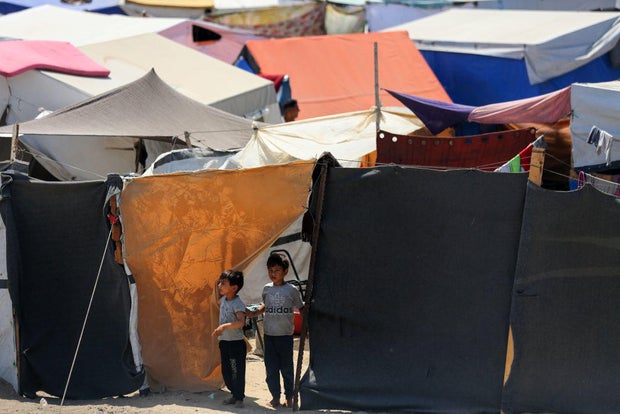The Biden administration is considering bringing certain Palestinians to the U.S. as refugees, a move that would offer a permanent safe haven to some of those fleeing war-torn Gaza, according to internal federal government documents obtained by CBS News.
In recent weeks, the documents show, senior officials across several federal U.S. agencies have discussed the practicality of different options to resettle Palestinians from Gaza who have immediate family members who are American citizens or permanent residents.
One of those proposals involves using the decades-old United States Refugee Admissions Program to welcome Palestinians with U.S. ties who have managed to escape Gaza and enter neighboring Egypt, according to the inter-agency planning documents.
Top U.S. officials have also discussed getting additional Palestinians out of Gaza and processing them as refugees if they have American relatives, the documents show. The plans would require coordination with Egypt, which has so far refused to welcome large numbers of people from Gaza.
Those who pass a series of eligibility, medical and security screenings would qualify to fly to the U.S. with refugee status, which offers beneficiaries permanent residency, resettlement benefits like housing assistance and a path to American citizenship.
While the eligible population is expected to be relatively small, the plans being discussed by U.S. officials could offer a lifeline to some Palestinians fleeing the Israel-Hamas war, which local public health authorities say has claimed the lives of more than 34,000 people and displaced hundreds of thousands of civilians in Gaza.
In a statement provided to CBS News late Tuesday night, a White House spokesperson said that the U.S. “has helped more than 1,800 American citizens and their families leave Gaza, many of whom have come to the United States. At President Biden’s direction, we have also helped, and will continue to help, some particularly vulnerable individuals, such as children with serious health problems and children who were receiving treatment for cancer, get out of harm’s way and receive care at nearby hospitals in the region.”
The statement went on to say that the U.S. “categorically rejects any actions leading to the forced relocation of Palestinians from Gaza or the West Bank or the redrawing of the borders of Gaza. The best path forward is to achieve a sustainable cease-fire through a hostage deal that will stabilize the situation and pave the way to a two-state solution.”
The Israeli government launched a military offensive and aerial bombardment of Gaza after Hamas staged an unprecedented attack across Israel on Oct. 7, killing roughly 1,200 people, most of them civilians. Hamas militants also abducted more than 200 people, many of whom continue to be in captivity.
CBS News has also reached out Department of Homeland Security and the State Department for comment.
The proposals to resettle certain Palestinians as refugees would mark a shift in longstanding U.S. government policy and practice. Since its inception in 1980, the U.S. refugee program has not resettled Palestinians in large numbers.
Over the past decade, the U.S. has resettled more than 400,000 refugees fleeing violence and war across the globe. Fewer than 600 were Palestinian. In fiscal year 2023, the U.S. welcomed 56 Palestinian refugees, or 0.09% of the more than 60,000 refugees resettled during those 12 months, State Department statistics show.
While many Democrats would likely support the move, admitting Palestinians as refugees could spur even more political challenges for the Biden administration related to the Israel-Hamas war. The conflict has already exposed rifts within the Democratic Party, triggered massive protests on college campuses and divided communities across America.
To qualify to enter the U.S. as a refugee, applicants have to prove they are fleeing persecution based on certain factors, such as their nationality, religion or political views. While some Palestinians could say they are fleeing repression by Hamas, others could identify the military and government of Israel, a top U.S. ally and recipient of American aid, as a persecutor.
The resettlement of Palestinian refugees, even if small in scale, could also garner criticism from Republicans, who have sought to make concerns about immigration and illegal crossings at the U.S.-Mexico border defining issues in November’s elections.
Soon after the Oct. 7 attacks by Hamas and the start of Israel’s offensive in Gaza, leading Republicans, including presidential candidates, said the U.S. should not welcome Palestinian refugees, claiming that they are antisemitic and potential national security risks.
In recent years, the Biden administration has dramatically increased refugee resettlement, which was slashed to record lows by former President Donald Trump. U.S. officials have set a goal of admitting up to 125,000 refugees in fiscal year 2024, which ends at the end of September.


